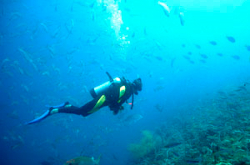스쿠버 다이빙

The word "scuba"/ stands for self-contained underwater breathing apparatus. Knowing how to dive/ opens up an entire underwater world/ of coral, fish, and other creatures.
Imagine swimming/ in clear blue waters/ as you look at small, brightly colored fish/ and the striking shapes of coral organisms. The underwater world/ is quiet/ except for the sound of your breathing. When you breathe out, you see many shining air bubbles/ floating upwards/ towards the surface of the water.
Since humans/ are not designed to see and breathe underwater, scuba diving/ requires several pieces/ of important equipment. Scuba divers/ must wear a mask/ in order to be able to see underwater. The mask/ creates an air space/ that protects the eyes and nose.
Scuba divers/ breathe with the help of a regulator, which brings air/ to the mouth/ when they inhale. The regulator/ is attached to an air tank/ that is placed/ on the diver's back. There is an extra regulator/ called an octopus, which is used/ in case of emergency situations.
Divers/ also wear a BCD, or buoyancy control device, to control how much they float or sink. A pressure gauge device/ tells divers/ how much air/ is left/ in the air tank. Or, a dive computer/ can calculate/ how much air/ is left/ as well as a diver's depth and the length of time/ he or she can stay underwater.
Divers/ wear scuba fins/ on their feet/ to help them/ move easily and quickly/ through the water. Many divers/ also wear a wetsuit/ in order to stay warm underwater.
To learn how to use all of this equipment, it helps/ to go to dive school. Becoming a certified diver/ requires taking three series of lessons. New divers/ must learn/ about the physics and safety of diving. And, they must practice diving skills/ first in a closed water area/ and then on actual beginner dives. Several organizations/ offer official diving certifications.
Scuba diving/ for fun/ first became possible/ with the development of the Aqualung/ by Jacques Cousteau and Emile Gagnan/ in the early nineteen forties. In the United States, articles/ in popular magazines/ about Cousteau and his underwater exploration methods/ helped bring attention/ to scuba diving. Because of the cost of the equipment, diving/ did not become a widely available sport/ until years later.
Taking diving classes and becoming certified/ are important/ for knowing how to dive safely. For example, you need to know/ how to put a regulator/ back in your mouth/ if it falls out underwater. And, you need to know/ how to clear your mask/ if it fills with water.
There are many other safety issues/ to consider/ when diving. For example, when going down deeper/ in the water, a diver/ must be careful/ to equalize the pressure/ in his or her ears. This is done/ by holding the nose/ and blowing very gently. Otherwise, the extreme pressure/ from the surrounding water/ can cause damage/ to the middle ear and sinuses.
Decompression sickness/ is a major concern/ for divers. The deeper a diver goes, the more pressure/ the surrounding water/ puts on the volume/ of the air/ inside his or her lungs. And, the deeper a dive, the more nitrogen gas/ goes into the diver's blood.
For safety reasons, a diver/ must measure the length of his or her dive/ based on its depth/ so as not to exceed a safe amount of nitrogen absorption.
When divers/ rise to return to the water's surface, they must continue to breathe/ and rise no faster/ than the air bubbles/ around them. For very deep dives, they must stop and decompress/ at certain levels. This way, the highly pressurized air/ in the diver's lungs/ has time/ to leave the body/ before it expands. If a diver/ rises to the surface/ too quickly, he or she can become extremely ill/ with decompression sickness, also known as "the bends."
Another important aspect/ to diving/ is having a "buddy" system. By having a diving partner, you can watch over one another/ and help each other/ if there is an accident.
One important diving rule/ is to never touch any of the sea life. This rule/ is both to protect the diver/ and to protect the underwater environment. For example, there is a reason/ fire coral/ received its name. This kind of coral/ causes a painful burning feeling/ if touched. A diver/ could also be cut/ by touching a sharp piece of coral.
Coral/ may seem hard like stone, but it is actually a very fragile organism. It can be damaged/ if divers/ touch or stand on it. In order to protect the beautiful coral reef systems, divers/ must treat them/ with care.

